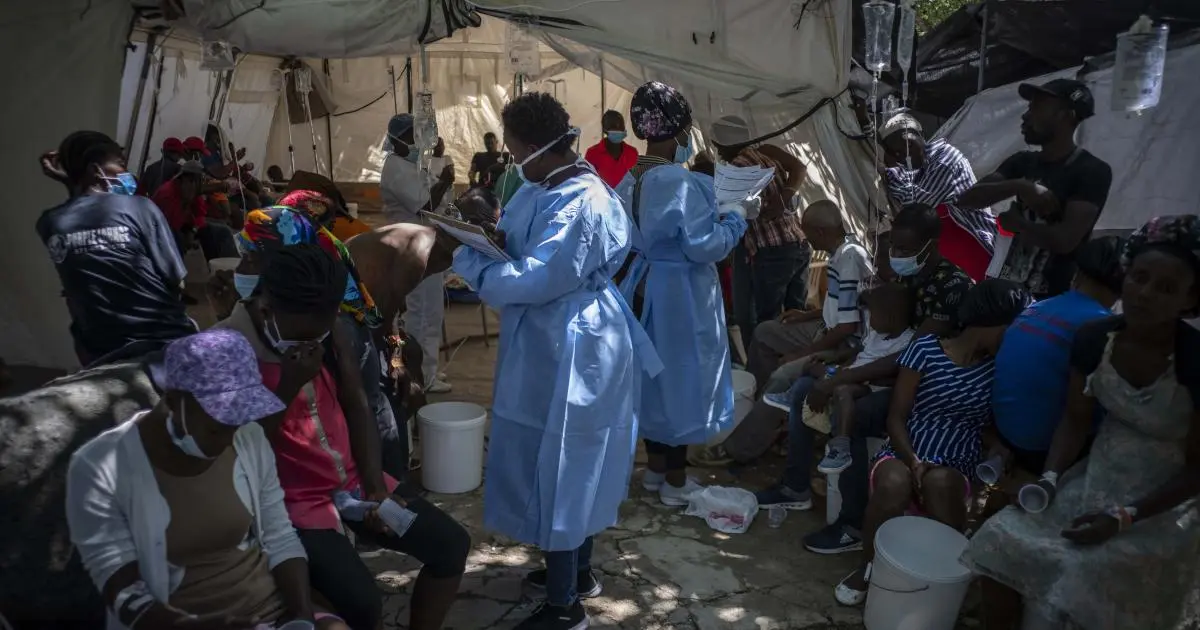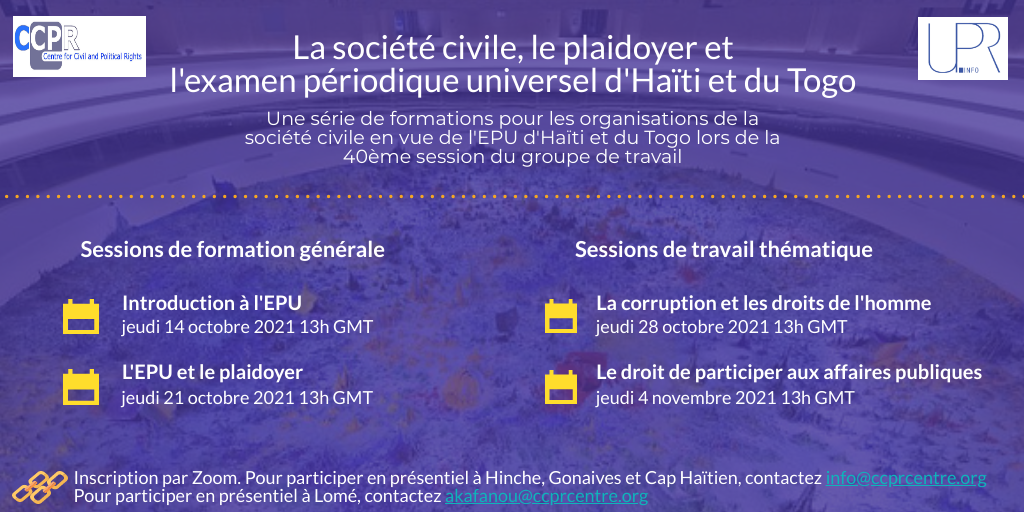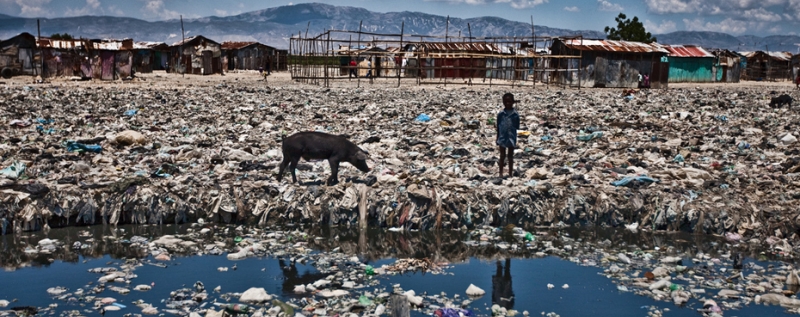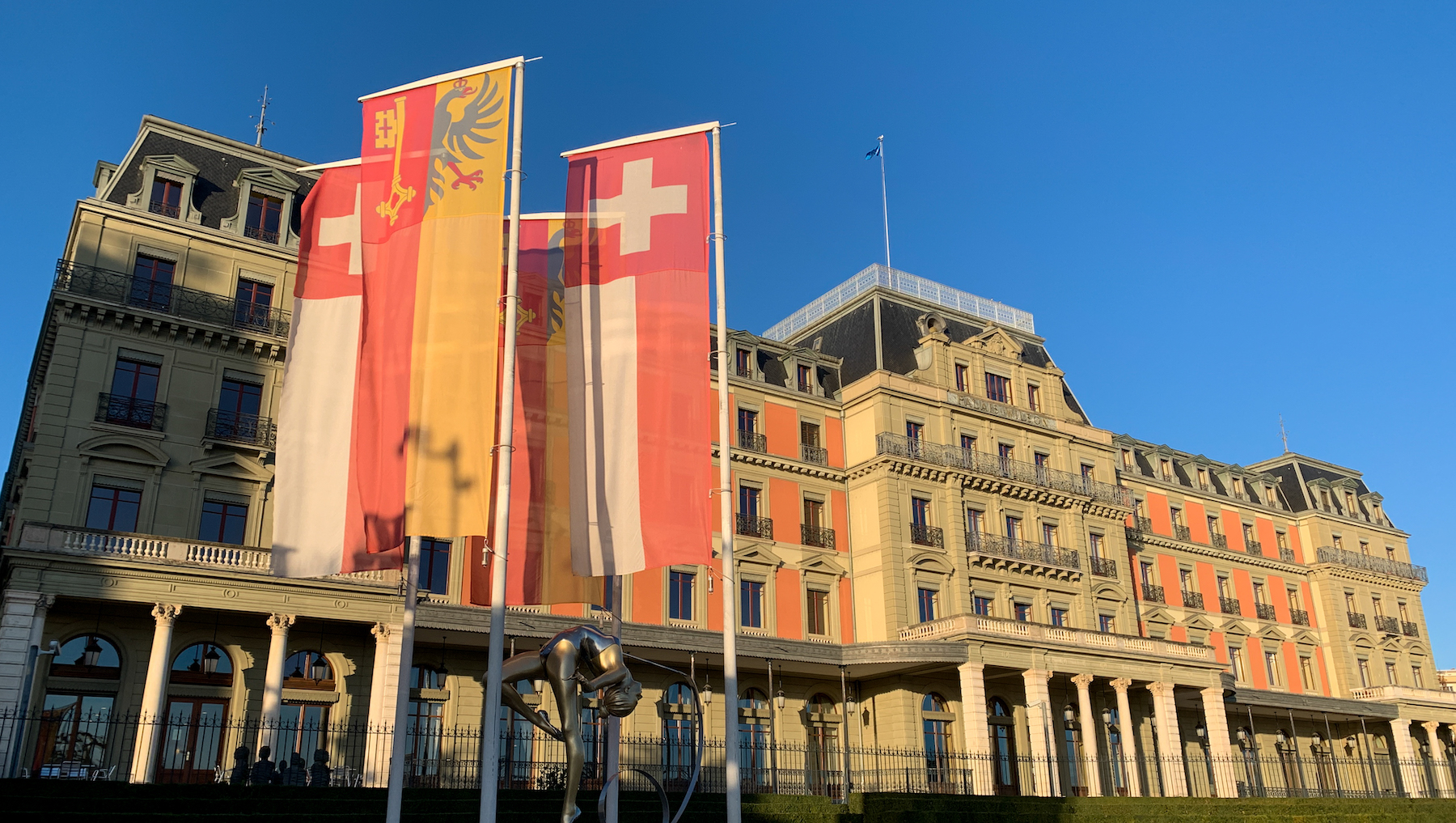Haiti’s long-delayed review before the Committee: Reflections on symbolism, silence, and structural fragility
Published on 28 Jul 2025, 02:22 PM
The Human Rights Committee finally held its long-postponed dialogue with the State delegation of Haiti
 Medical personnel attend patients with cholera symptoms at a clinic run by Doctors Without Borders in Port-au-Prince, Haiti, October 27, 2022. Author: AP Photo/Ramon Espinosa
Medical personnel attend patients with cholera symptoms at a clinic run by Doctors Without Borders in Port-au-Prince, Haiti, October 27, 2022. Author: AP Photo/Ramon Espinosa
On 3 and 4 July 2025, the Human Rights Committee (CCPR) finally held its long-postponed dialogue with the State delegation of Haiti, examining the country’s implementation of the International Covenant on Civil and Political Rights (ICCPR) reflected on its second State report. This session marked what was technically the fourth attempt to conduct the review. Previous sessions were cancelled at the last minute, often without clear explanation, leaving civil society organizations in Haiti and abroad deeply frustrated and exhausted after repeated cycles of preparation without delivery.
The CCPR Centre regrets these repeated delays. Such inconsistency undermines not only the credibility of the mechanism, but also the morale and capacity of civil society actors, who had mobilized shadow reports, briefing papers, and testimonies time and again—only to see their work go unused. Many NGOs and human rights defenders have expressed a growing disillusionment with the process, citing lost opportunities for advocacy, donor disengagement, and the risk of tokenism when repeated postponements become the norm.
A minimal delegation with symbolic representation
The delegation that finally appeared in Geneva on 3 and 4 July 2025 consisted of just five members—an unusually small number for such a high-level review. It was led by the Minister for the Status of Women and Women's Affairs, who, in her opening statement, acknowledged the limited size of the delegation and explained that many government officials lacked valid travel documents, which had prevented their participation. This admission laid bare the broader administrative dysfunction currently gripping the Haitian State, where even routine government procedures such as the issuance of diplomatic passports appear to be stalled by the national crisis.
The gender composition of the delegation—four women and one man—was visibly symbolic. While this representation was welcomed by many Committee members and observers, it stands in stark contrast to the actual political reality in Haiti, where only around 2.5% of parliamentary seats are held by women, no women currently serve in the Senate, and fewer than 5% of political parties are led by women. Thus, while the Geneva delegation projected an image of gender inclusivity, it did not reflect the deeply entrenched inequality in Haitian political life.
Over the course of the dialogue, Committee members voiced grave concerns over Haiti’s ability to guarantee fundamental rights in the face of systemic collapse, focusing particularly on the rule of law, pervasive impunity, and gender-based violence.
Endemic impunity and weakness of the justice system
The Committee strongly emphasized that impunity remains one of the greatest obstacles to the protection of civil and political rights in Haiti. The State was asked to clarify progress on emblematic cases, including the La Saline and other massacres and the long-stalled case concerning human rights violations committed during the Duvalier regime. Committee experts lamented the lack of concrete judicial outcomes, noting that many cases involving grave abuses remain unpunished, often due to insecurity and the paralysis of the judiciary.
The delegation cited recent reforms, including the establishment of two specialized judicial units for mass crimes and financial corruption, as signs of renewed commitment to justice. However, the Committee raised doubts regarding the independence and operational capacity of these institutions, given longstanding interference and under-resourcing. Judges and prosecutors reportedly face intimidation, especially in financial crime cases, and impunity is aggravated by the destruction of judicial infrastructure in gang-controlled zones.
Gender-based violence and displacement
Committee members expressed deep concern over the systematic and widespread violence against women and girls, especially in areas under gang control. Reports of mass rape, survival prostitution, and abuse of minors—including children as young as five—illustrate the use of sexual violence as a weapon of control and terror. Despite some initiatives, including the 2017–2024 National Plan to Combat Gender-Based Violence, the Committee criticized the government’s response as insufficient and weakly implemented.
The delegation pointed to recent efforts such as the establishment of one-stop service centers providing legal, medical, and psychosocial assistance, as well as plans for a national action plan on Women, Peace and Security. However, questions remained about the geographic reach, effectiveness, and resourcing of these services—particularly for internally displaced women. The Committee also asked why key legislative reforms, including the criminalization of marital rape and femicide, remain blocked due to the absence of a functioning parliament.
Crisis of security and popular justice
With more than a million people displaced and armed gangs reportedly controlling large portions of Port-au-Prince and strategic infrastructure, the Committee noted the catastrophic erosion of public order. Numerous Committee members highlighted the increase in extrajudicial killings and acts of so-called “popular justice,” such as lynchings, stonings, and immolations. They asked the State what efforts were being made to investigate these incidents, particularly when members of the police are suspected of encouraging or tolerating such acts.
The Haitian delegation reaffirmed that lynchings are not part of national culture and condemned such acts unequivocally. They described ongoing efforts to restore trust between citizens and the police, including joint operations with international partners such as Kenya and Colombia. However, the Committee cautioned that unless systemic corruption and the circulation of weapons are addressed, true security and institutional trust cannot be restored.
Looking forward
In response to the Committee’s questions on the announced constitutional referendum and future elections, the delegation explained that Haiti had been divided into "green" and "red" zones, depending on levels of gang control. Committee members expressed serious concerns about the feasibility of conducting an inclusive and rights-compliant referendum or elections under such conditions, especially if entire regions remain excluded from political participation.
Despite the immense challenges, the Committee encouraged Haiti to uphold its obligations under the ICCPR and to take concrete steps to restore the rule of law, protect its most vulnerable populations, and ensure meaningful civil and political rights for all.
Watch the review session again here (day 1) and here (day 2).
Disclaimer: Transcripts of the dialogue available here powered by WIPO Speech-to-Text served as the main source of the presented article. While all the information was carefully checked, please refer to the audio or UN WebTV for an official version of the dialogue.
Recommendations of the Human Rights Committee
The Concluding Observations on Haiti's second periodic report were released on 18th July 2025. The State party is requested to provide, by 18th July 2028, information on the following recommendations:
Violence against women
The State Party should strengthen efforts to eliminate violence against women, especially gang-related sexual violence, by combating impunity and protecting victims. Specifically, it should:
- (a) Ensure national laws criminalize all forms of violence against women, including incest;
- (b) Investigate all allegations, prosecute offenders, and provide survivors with remedies and reparations;
- (c) Create mechanisms to support and encourage victims to report abuse and raise public awareness;
- (d) Allocate resources for shelters and support services, ensure their accessibility—particularly in gang-affected areas—and train officials to handle such cases effectively.
Right to life
In line with General Comment No. 36, the State Party should take all necessary measures—potentially with international cooperation—to protect the right to life amid widespread gang violence. Specifically, it should:
- (a) Develop and implement policies to dismantle gangs and self-defense groups by addressing structural causes, including arms trafficking;
- (b) Investigate homicides, extrajudicial killings, and excessive force, ensure accountability, and provide full reparations to victims and families;
- (c) Align laws and practices on use of force with international standards, limit lethal force to life-threatening situations, and provide appropriate training;
- (d) Increase resources for the National Police and its Inspectorate to strengthen their effectiveness and independent oversight capacity.
Elimination of slavery, servitude, and human trafficking
The State Party should strengthen efforts to prevent and combat trafficking in persons, including child recruitment, exploitation, and forced labor. Specifically, it should:
- (a) Investigate and prosecute cases of trafficking, domestic service, and child labor, ensuring appropriate penalties;
- (b) Improve identification of trafficking victims and provide them with protection, support, and reintegration services;
- (c) Implement prevention strategies to protect children from gang recruitment, address root causes, and develop community-based and reintegration programs;
- (d) Enhance training and coordination among judicial, law enforcement, labor, and anti-trafficking agencies;
- (e) Allocate sufficient resources to all relevant institutions and support civil society efforts;
- (f) Amend the Penal Code to abolish forced labor as a criminal sanction.
Here, you can find all the recommendations given by the Committee in the Concluding Observations.
The follow-up report of Haiti on the implementation of recommendations is due in 2028. The next list of issues will be adopted in 2031, and the next periodic report is due in 2032.
 Medical personnel attend patients with cholera symptoms at a clinic run by Doctors Without Borders in Port-au-Prince, Haiti, October 27, 2022. Author: AP Photo/Ramon Espinosa
Medical personnel attend patients with cholera symptoms at a clinic run by Doctors Without Borders in Port-au-Prince, Haiti, October 27, 2022. Author: AP Photo/Ramon Espinosa





